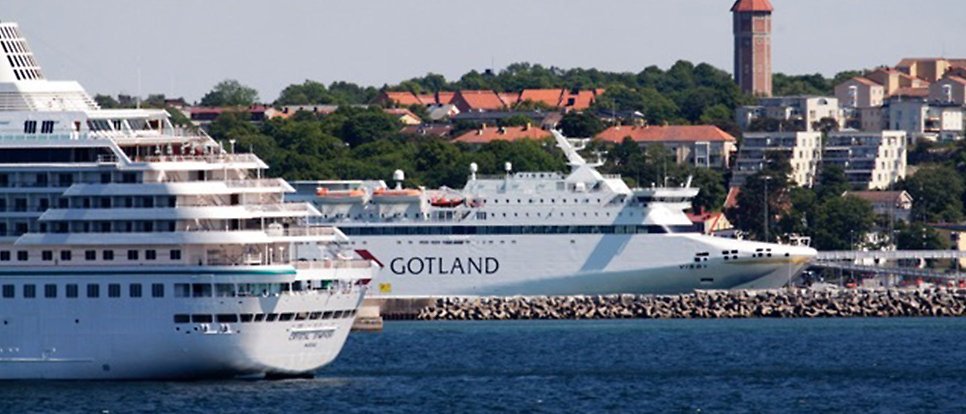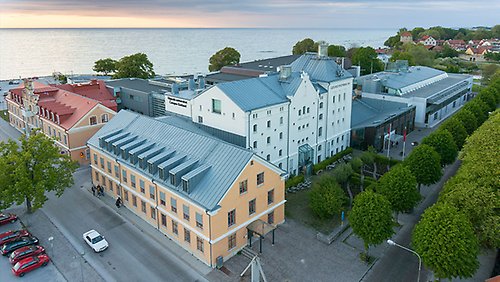Master's Programme in Sustainable Destination Development
120 credits

Fewer visitors threaten the economy, more visitors threaten ecological and social sustainability. How can we make visits sustainable? This is what you will explore in the Master's Programme in Sustainable Destination Development. During your studies you will work together with researchers and lecturers on a wide range of subjects which will open the doors for your career in sustainable destination development.
Autumn 2023 Autumn 2023, Visby, 100%, On-campus, English
- Location
- Visby
- Pace of study
- 100%
- Teaching form
- On-campus
- Instructional time
- Daytime
- Start date
- 28 August 2023
- Language of instruction
- English
- Entry requirements
-
Academic requirements
A Bachelor's degree, equivalent to a Swedish Kandidatexamen, from an internationally recognised university.
Language requirements
Proficiency in English equivalent to the Swedish upper secondary course English 6. This requirement can be met either by achieving the required score on an internationally recognised test, or by previous upper secondary or university studies in some countries. Detailed instructions on how to provide evidence of your English proficiency are available at universityadmissions.se.
- Selection
-
Students are selected based on an overall appraisal of previous university studies and a statement of purpose.
- Fees
-
If you are not a citizen of a European Union (EU) or European Economic Area (EEA) country, or Switzerland, you are required to pay application and tuition fees.
- Application fee: SEK 900
- First tuition fee instalment: SEK 72,500
- Total tuition fee: SEK 290,000
- Application deadline
- 16 January 2023
- Application code
- UU-M1470
- Additional information
-
In addition to the general supporting documents, you also need to submit a programme-specific statement of purpose (1 page).
Check the application guide for information on how to apply and what other supporting documents you need to submit.
About the programme
Tourist destinations across the world face major challenges. With fewer visitors, their economies will be threatened; with more visitors, their social, cultural and ecological sustainability will be threatened. The programme will explore key questions such as, how can visits become sustainable? What is required to achieve sustainable visitor locations, and how can we ensure they will remain this way?
In close collaboration with the tourist industry, regional authorities and the community, you will be requested to perform theoretical, strategic and practical work, including all the challenges visitor-intensive regions across the world will be facing in the future. The aim of the programme is to familiarise yourself with issues relating to sustainable regional and destination development from many different perspectives for use in your future occupation, encompassing supervision, community planning, education, research, communication, management of natural resources, entrepreneurship or decision-making.
Sustainable Destination Development is aimed at those who want to develop cross-border, international key competencies in this field. You choose two of three specialisations - entrepreneurship, cultural heritage policies and nature-based tourism - to develop your desired academic profile.
During the programme you can expect to:
- specialise in areas of your interest,
- develop your own projects within the scope of the programme themes,
- study in a truly unique academic environment.
You will be studying themes such as ecological and cultural sustainability, the shape and importance of locations, management of natural and cultural resources, the principles of environmental assessment, entrepreneurship and strategic leadership. At Campus Gotland, you will find dedicated researchers and lecturers who work with sustainability from a broad, critical and cross-border perspective, and in close proximity to all the players who in one way or another work with tourist visits.
The programme will prepare you for a career focusing on sustainability issues in tourist-intensive regions anywhere in the world, in public administration, at a national, regional and local level, in destination companies, in private tourist enterprises or as an independent entrepreneur. The interdisciplinary design of this programme will promote the understanding of different subject areas and will strengthen knowledge of the opportunities and limitations of sustainable development.
Degree
The programme leads to the degree of Master of Science (120 credits) with Sustainable Destination Development as the main field of study. After one year of study, it is possible to obtain a degree of Master of Science (60 credits).
Content
The first semester starts with an introductory course on Sustainable Destination Development. You will then take courses with one of your chosen specialisations: applied heritage politics; sustainability, assessment and management of nature-based destinations; or entrepreneurship for sustainable destination development.
The second semester starts with a hands-on project course for multidisciplinary teams. You will use a so-called design thinking methodology to work with a sustainability challenge. A methods course follows this. During the second part of the semester, you will choose a course at Uppsala University or do an internship or project course. You might also choose to obtain a master's degree after one year on the program if you study the course "Degree Project in Sustainable Destination Developmement". The course is then counted as a degree project.
The third semester begins with an advanced course in Sustainable Destination Development. After this, you will study one of the other two specialisations.
The fourth semester is dedicated to your degree thesis, which should be based on your two chosen specialisations.
Courses within the programme
Learning experience
In the classroom, we use lectures, seminars, and group and individual work, with both theory and practice. In a seminar, you present your ideas and discuss with your classmates a course book or other study material that you are required to read before the seminar; while the teacher usually only moderates the discussion. The aim is to develop critical thinking and collaborative skills. All the students are expected to be active participants in all forms of discussions. You will complete group work together with your classmates outside the classroom. This way, you learn from each other and you train to be a team player.
Important parts of the education take place outside the classroom, in the real world, with excursions and working together with public and private actors on Gotland.
Teaching is closely related to the large, multidisciplinary research programme "Sustainable Visits", in which 30 researchers from 9 disciplines are studying and developing sustainable destination development on Gotland. During your studies, you will both meet many of these researchers, and get the opportunity to contribute to their research projects.
Interaction with students from different countries will also stimulate the understanding of the complexity of sustainability challenges as well as boost the knowledge of possible solutions to the issues, while it will provide you with an invaluable network of like-minded people in this field.
Examination varies from written exams, oral presentations and independent writing.
The language of instruction and literature in English. The teaching takes place on Campus Gotland.
Career
The tourism sector contributes 9% to the world's GDP and is continuously growing. As such, the tourism sector is becoming increasingly important outside the industrial world and hence it is increasingly crucial to the development of the world as a whole. The tourism sector, however, is also increasingly facing even more sustainability challenges, socially, ecologically and financially. There is thus a great need for the competencies you will acquire by completing this programme.
This programme prepares you to work on sustainability issues in the tourism sector in regions across the world: within public administration locally, regionally and nationally, at destination companies, within the private tourism sector or as an entrepreneur. You can choose a career related to development, strategy and management, particularly regarding natural and cultural resources, or in public and private destination companies.
Your work could cover business development, sustainability and Corporate Social Responsibility (CSR) to push innovation both in the private and public sectors. You will acquire skills covering supervision, community planning, education, research, communication, management of natural resources and decision-making related to sustainability issues.
This is also an opportunity to prepare for research and doctoral studies. Campus Gotland offers an interdisciplinary research environment with a strong focus on sustainability, as is the case in Gotland. You can choose to perform research in industrial engineering and management, ethnology, geology, history, heritage studies or business.
Career support
During your time as a student, UU Careers offers support and guidance. You have the opportunity to take part in a variety of activities and events that will prepare you for your future career.
Is this programme right for you?
Watch our programme videos.

Study in Visby
What is it like studying at Campus Gotland?

Register your interest
Keep updated about the application process.

Programme syllabus
- Programme syllabus valid from Autumn 2024
- Programme syllabus valid from Autumn 2023
- Programme syllabus valid from Autumn 2022
- Programme syllabus valid from Autumn 2021
- Programme syllabus valid from Autumn 2020
- Programme syllabus valid from Autumn 2019, version 2
- Programme syllabus valid from Autumn 2019, version 1
- Programme syllabus valid from Autumn 2018
Contact
- For programme-specific questions, please contact:
- studentservice-cg@uu.se
- For admissions-related or general information, please contact our applicant support team:
- masterprogrammes@uu.se
Students
As a student you will find information about your studies in the student gateway.
